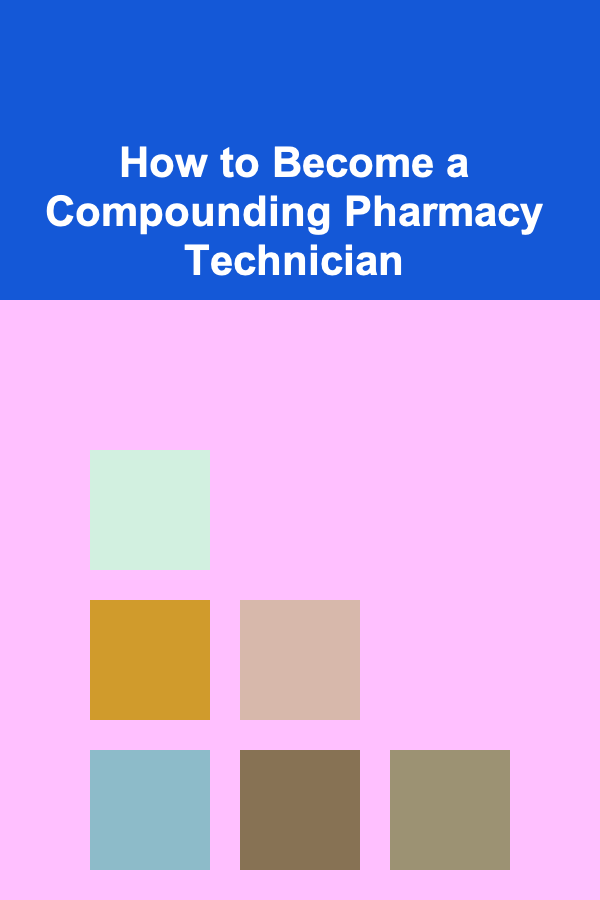
How to Become a Compounding Pharmacy Technician
ebook include PDF & Audio bundle (Micro Guide)
$12.99$5.99
Limited Time Offer! Order within the next:

Pharmacy technicians are integral members of the healthcare system, supporting pharmacists in delivering medications to patients, ensuring that prescriptions are filled accurately, and offering essential services to patients. Compounding pharmacy technicians, in particular, focus on preparing customized medications for patients, including creating prescriptions tailored to individual needs, such as those that cannot be filled with commercially available options. This specialized field requires a blend of technical expertise, attention to detail, and regulatory knowledge.
This comprehensive guide will walk you through the steps to become a compounding pharmacy technician, the skills required for the role, job prospects, and how to advance in this rewarding career.
What is a Compounding Pharmacy Technician?
A compounding pharmacy technician works in a pharmacy setting where they are responsible for preparing medications that are specifically tailored to patients. This often involves creating customized formulations of prescriptions for patients who may need specialized dosages, forms (like creams, ointments, or suppositories), or medications that are unavailable in standard commercial preparations.
Unlike traditional pharmacy technicians who focus on filling standard prescriptions, compounding pharmacy technicians must follow exact formulations and precise measurements to ensure that the medications are safe and effective for individual use.
Responsibilities of a Compounding Pharmacy Technician
The primary responsibilities of a compounding pharmacy technician include:
- Preparation of Medications: Mixing, measuring, and compounding ingredients to create custom medications, often from scratch.
- Ensuring Accuracy: Following exact prescriptions and formulations, verifying ingredients, and confirming measurements to avoid any errors.
- Maintaining Sterility: For sterile compounding (such as injectable medications), compounding technicians must maintain strict sterility protocols to prevent contamination.
- Maintaining Equipment and Supplies: Ensuring that the necessary equipment is clean, functional, and calibrated to industry standards. This includes tools like scales, mixers, and protective equipment.
- Recordkeeping: Documenting the preparation and compounding process to comply with legal and regulatory requirements.
- Patient Safety: Ensuring that compounded medications are prepared safely and effectively, with a focus on patient safety.
- Quality Control: Performing routine checks to ensure the medications meet quality standards, both for effectiveness and safety.
Skills Required to Become a Compounding Pharmacy Technician
To excel as a compounding pharmacy technician, you will need a set of specialized skills that go beyond general pharmacy technician duties. These include:
- Attention to Detail: Given the precision required in compounding medications, a keen eye for detail is crucial in ensuring that each formula is accurate.
- Technical Knowledge: A deep understanding of pharmaceutical ingredients, dosages, and forms, along with knowledge of proper compounding techniques, is essential.
- Mathematical Skills: The ability to calculate precise measurements and dosages for medications is vital. This includes performing unit conversions, fractions, and other mathematical calculations.
- Sterile Compounding Knowledge: For those involved in sterile compounding, understanding how to work within a sterile environment and handle hazardous substances is important.
- Problem-Solving Skills: Sometimes compounding pharmacy technicians may face unique challenges or obstacles when creating prescriptions. The ability to think critically and problem-solve is essential.
- Communication Skills: While compounding pharmacy technicians work primarily with medications, effective communication with pharmacists, patients, and healthcare providers is important to ensure the best outcomes.
- Time Management: Since compounding prescriptions often requires precise measurements and steps, efficient time management is crucial for meeting deadlines and fulfilling patient needs.
Steps to Become a Compounding Pharmacy Technician
Becoming a compounding pharmacy technician involves a combination of education, hands-on training, certification, and regulatory compliance. Here's a step-by-step guide on how to pursue this career:
1. Obtain a High School Diploma or Equivalent
The first step to becoming a pharmacy technician is earning a high school diploma or GED. In high school, focus on subjects like chemistry, biology, mathematics, and health sciences, as they will provide the foundational knowledge needed for pharmacy technician training.
2. Complete a Pharmacy Technician Training Program
While some employers may hire individuals with only a high school diploma, completing a formal pharmacy technician training program is highly recommended. These programs typically last from six months to two years and cover essential pharmacy topics, including pharmacology, drug interactions, pharmacy law, and pharmacy calculations.
Look for programs that include coursework in compounding, as this will give you a head start in this specialized field. Many community colleges, technical schools, and online institutions offer pharmacy technician programs.
3. Gain Hands-On Experience
After completing your formal training, you will need hands-on experience to develop your compounding skills. Many pharmacy technician training programs include an internship or externship where you work under the supervision of experienced pharmacy technicians and pharmacists in a real-world pharmacy setting.
During this period, you will have the opportunity to observe and practice the compounding process, refine your skills, and become familiar with compounding equipment and techniques.
4. Obtain Certification
While certification is not always required to work as a compounding pharmacy technician, obtaining certification can increase your employability and demonstrate your expertise to employers. The most common certification for pharmacy technicians is through the Pharmacy Technician Certification Board (PTCB), which offers the Pharmacy Technician Certification Exam (PTCE).
For those specializing in compounding, there is also the Board of Pharmacy Specialties (BPS), which offers a certification in Sterile Compounding and Aseptic Technique (CSPT). Obtaining this certification demonstrates that you have specialized knowledge in compounding practices, particularly for sterile medications.
5. Stay Current with Continuing Education
To maintain certification and stay competitive in the field, it's important to participate in continuing education (CE). This is particularly relevant in compounding pharmacy, where new techniques, regulations, and best practices are constantly evolving.
Many organizations, including the National Community Pharmacists Association (NCPA) and American Pharmacists Association (APhA), offer CE courses tailored to compounding pharmacy technicians. These courses help keep you up-to-date with the latest trends and regulations in the field.
6. Pursue Advanced Career Opportunities
Once you've gained experience and certification as a compounding pharmacy technician, there are opportunities to advance your career. Some pharmacy technicians move into supervisory or managerial roles, overseeing the work of other technicians or managing the daily operations of a compounding pharmacy.
Alternatively, you might choose to specialize further, focusing on areas like sterile compounding or veterinary compounding, which require additional expertise and training.
Working Environment for Compounding Pharmacy Technicians
Compounding pharmacy technicians work in a variety of settings, including:
- Independent Pharmacies: Many compounding pharmacy technicians work in independent pharmacies that specialize in creating custom medications for patients.
- Hospital Pharmacies: Hospitals often have compounding departments that create specialized medications for patients, especially for inpatient care.
- Pharmaceutical Manufacturers: Some compounding technicians work with pharmaceutical companies that produce medications on a larger scale.
- Research Facilities: For those interested in the scientific side of compounding, research institutions or labs may offer opportunities to work with new drug formulations.
In each of these environments, compounding pharmacy technicians must follow strict safety protocols to ensure that medications are compounded safely and accurately. Depending on the role, technicians may work closely with pharmacists, healthcare providers, and patients to ensure the best outcomes.
Job Outlook and Salary
The demand for pharmacy technicians is growing, and with the increasing need for personalized medications, the field of compounding pharmacy is expected to see continued growth. According to the U.S. Bureau of Labor Statistics (BLS), employment of pharmacy technicians is projected to grow by 7% from 2020 to 2030, faster than the average for other occupations.
The salary for a compounding pharmacy technician can vary based on location, experience, and certification. On average, pharmacy technicians earn around $35,100 per year, but those specializing in compounding may earn a higher salary, particularly if they have advanced certifications or work in specialized settings.
Conclusion
Becoming a compounding pharmacy technician is a rewarding career choice for those who have an interest in pharmacy, chemistry, and patient care. With the right education, certification, and hands-on experience, you can build a successful career in this specialized field. By developing the necessary skills and staying up-to-date with industry standards, you can make a significant impact on patient care by ensuring that compounded medications are prepared safely and effectively.
Reading More From Our Other Websites
- [Home Party Planning 101] How to Use Simple Decorations to Make Your Home Party Look Stunning
- [Home Budget Decorating 101] How to Incorporate Neutral Tones into Your Home Decor Affordably
- [Personal Finance Management 101] How to Improve Your Credit Score in 5 Easy Steps
- [Personal Care Tips 101] How to Choose Aftershave for Sensitive or Reactive Skin
- [Biking 101] The Ultimate Guide to Bike Safety: Rules, Gear, and Best Practices
- [Home Maintenance 101] How to Prepare Your Lawn for Winter: A Guide to Fall Lawn Care and Landscaping
- [Home Cleaning 101] How to Clean and Organize Kitchen Cabinets
- [Home Staging 101] How to Create a Mood Board for Your Staging Project
- [Home Holiday Decoration 101] How to Use LED Christmas Glitter Candles for a Festive Glow
- [Skydiving Tip 101] Risk, Regulation, and Reward: The Legal Landscape of Skydiving vs. Base Jumping

How to Create a Themed Party That Will Wow Your Guests
Read More
How to Organize Your Fitness and Health Goals
Read More
How to Use Vintage Decorations to Add Charm to Your Holiday Home
Read More
How to Stay Motivated on Your Healthy Eating Journey
Read More
Financial Planning After Divorce: Rebuilding Your Financial Future
Read More
10 Tips for Cinematographers Shooting on Vintage Lenses
Read MoreOther Products

How to Create a Themed Party That Will Wow Your Guests
Read More
How to Organize Your Fitness and Health Goals
Read More
How to Use Vintage Decorations to Add Charm to Your Holiday Home
Read More
How to Stay Motivated on Your Healthy Eating Journey
Read More
Financial Planning After Divorce: Rebuilding Your Financial Future
Read More